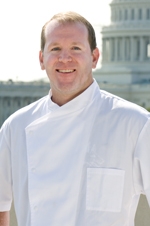Interview with Chef Clayton Miller of Trummer's on Main - Clifton, Virginia
Will Blunt: What inspired you to pursue cooking professionally?
Clayton Miller: I don't have that romantic story talking about my grandmother’s apron. I went off to college for hotel and restaurant management, not knowing what I'd get into. I started leaning toward restaurants, still with no intention of cooking. So, I said I'll need to know a bit about it, went to culinary school, and it hit me right from the beginning.
WB: What is your philosophy on food and dining?
CM: For me it's about constantly evolving. The way you watch people develop and who they were five years ago is probably completely different from who they are today. That's what’s so exciting about being a cook. You're never finished. It's not like you go, ‘I'm done.’ I guess that does happen to some people but there's always more to discover and eat!
As far as dining, I like something that interests me on several levels—not just how it tastes. That it bring some form of emotional interest, that the dish has some heart, that the person doing it put something into it, from really complex food to a grilled oyster—that’s really interesting to me.
WB: What goes into creating a dish?
CM: Trial and error; every once in a while I get lucky, but a lot of my dishes have come together over the years. Something that was a component on a dish years ago will inspire a dish out of nowhere, like the quinoa and mussel salad. The quinoa was inspired by a meal at Mugaritz, this would've been 2005 or 2006. This is back when he started doing all the rocks and stuff; he did a lot of things that were really inspiring, then some things I was like, ‘What are you doing man?’ I had a quinoa dish and langoustines there; I'd say it was one of the top five meals I've had. And at that point people had suggested to me that I use quinoa and I said to myself, ‘I get quinoa now.’ Over the years a lot of ideas came into my head. They don't always work either. There have been a few times I've been shoveling things into the trash.
WB: How involved are you in your local culinary community?
CM: I'm still in some ways the new kid on the block. We're coming up on our first year anniversary within a few days. We're a little further outside of the city, but we've been getting involved in a lot of charity events over this year. We did a dinner with Charlie Palmer, RJ Cooper, Matt Hill from Charlie Palmer, Damon Gordon, and Santosh Tiptur, getting to know a few of the other guys around here. It’s kind of funny how often paths cross.
WB: What’s the toughest thing you’ve had to do in your career?
CM: The toughest thing is being responsible for the guys I've worked with; making sure they're getting a beneficial experience working with me, that they're learning. That’s the hardest thing for me. I often feel they deserve more and that I have to give them more.
WB: What trends do you see emerging?
CM: I think that this is something that's been focused on a long time: local products. DC is on the verge of making a dramatic push in that direction. We just need someone to bring it all together. Shenandoah Valley—it’s incredible what's out there, things I've struggled to find. It just needs another oomph and it will take off even bigger. Shenandoah Valley can rival the Hudson Valley.
WB: Where will we find you in five years?
CM: I’d like to take on a different concept, anything from a great seafood place or a BBQ place or a bar doing really great bar food with a focus on fried foods. A great example is—and we used to have it on our bar menu—a section that says ‘fried, salty, and crunchy.’ Not just potato chips, not just wings, although those are great too.






